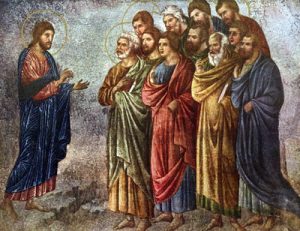 A crowd so large has gathered that Jesus and his disciples are not even able to eat their bread. His family comes to take him away because they think he is beside himself. This gives Jesus the opportunity to point out that family for him is not based on results from a search on Ancestry.com.
A crowd so large has gathered that Jesus and his disciples are not even able to eat their bread. His family comes to take him away because they think he is beside himself. This gives Jesus the opportunity to point out that family for him is not based on results from a search on Ancestry.com.
Have you ever accused someone of being out of their mind? Probably…. but then you might remind yourself, you can’t judge a book by its cover. And, remember the ancient American Indian proverb: “Before you judge another person, walk a mile in that person’s moccasins.” If you lived in that person’s head, if you had the identical life-experiences you’d really have no other choice than to do exactly what she did. It’s advisable to refrain from statements that begin: she “coulda, woulda, shoulda….” And, obey the maxim “thou shalt not should upon thyself.” Crazy is how some people viewed Jesus during his early ministry.
The evangelists tell us that some people were quite alarmed by Jesus’ behavior. His family was certainly alarmed. Mark reports that when his family and friends heard about his preaching and behavior they went out to seize him: for they said, “He is insane.”
We might take a benevolent interpretation of their action and suggest that the family was taking an intervention action out of loving concern and support for him. They wanted to make sure he was eating right, getting enough sleep and not working too hard. But, it seems unlikely that was the honest motivation for the intervention.
In his youth, most of the time his family probably thought of Jesus as a normal boy. His cousins and friends accepted him as one of the neighborhood kids, just one of them.
I suspect he might have tried to keep their nonsense under control and lead them down the right path. So, they were not overly surprised when he began street preaching, but now he had gone overboard. He was so often in the public eye, things were getting a little out of control and they urged him to quit.
In the instance reported in his Gospel reading, several of them came as a group ready to distract and get him away from the crowds. But, their attempt at an intervention wasn’t working. They tried sending him a message that his family was waiting to talk to him. He left them standing on the outside. He seemed to dummy up; he threw the messengers a zinger with the question: “Who are my mother and my brothers?”
His family is frustrated with him, or just plain worried about him. They hear that Jesus is drawing crowds again, and they go to rescue him — because people are talking about “our boy.” Some of the people think he’s loony. His family is embarrassed and worried of what might become of him. But, Jesus doesn’t seem to mind at all. After all, he knows how badly it’s all going to turn out.
He tells the crowd, and us, mine is an extended family – everyone is welcome. I embrace anyone and everyone. These people may look like a group of misfits, but they’re family.
So, I wonder: who might be at our door, looking to get in, to speak to us? Be a part of our family, preserve our reputation and tell the world what a great place we have here and what a pleasant group of people we are?
Our oblates come immediately to mind. You probably realize this, there are more Benedictine Oblates in the U.S. than the combined number of professed Benedictine men and women living in communities. Worldwide there are currently 25,000 oblates compared to 21,000 Benedictine monks and sisters.
You see it here on Oblate Sunday. We could have upwards of 30 Oblates gather for the day. That’s almost 3 times the size of our community. In the interim between meetings, they are reaching out into the greater community, telling our story, often better than we do. They are immersed in “the world,” living out the values and mission of our community. It’s true that they come to us to get refueled, to learn more about the Benedictine charism, but it’s equally true, as Joan Chittister says in the recent issue of BENEDICTINES, “Oblates are the hope in this century that the life and values of the Benedictine vision can be born … again and anewed.”
So, when we hear the summons, “Your family is outside asking for you,” how shall we respond, what shall we do?






